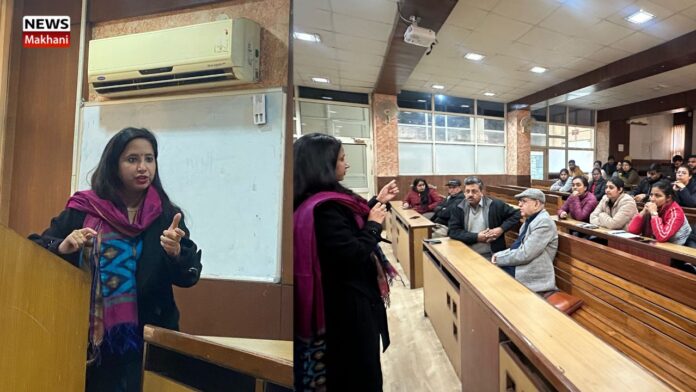Chandigarh January 04, 2024
A seminar on “AI for Forensics: Generalizable and Safe Deep Models for Fingerprint Preprocessing” on3rd January, 2024 at Panjab University by the Northern Region S & T Cluster (PI-RAHI) as part of the series initiated titled “AI for Good”. The lecture was delivered by Dr. Indu Joshi,Assistant Professor at National Institute of Technology Delhi and was attended by many students and faculty from the departments of Biochemistry, forensic Science, Microbiology and Anthropology.
In the lecture, Dr. Joshi discussed about the common problems associated with latent fingerprinting. The most common issue with latent fingerprinting is the data uncertainty that originates due to noise present in a given input.Though, many computer-based applications are present that help in fingerprint analysis but due to their lack of generalizability and reliability, along with thelack of safety in deep learning models, they are not widely used in forensic investigations This is particularly important as no methodology is available for the fingerprints of Indian population as the western data is not reliable of indigenous population. However, inadequate ridge structure, overlapping unstructured noise, noisy backgrounds, and other compounding issues make automatic matching of latent fingerprints with a gallery of live scan images extremely difficult. Thus, an efficient enhancement module is required to match latent fingerprints rapidly and enable accurate minutiae extraction. In this lecture, Dr. Joshi discussed about a latent fingerprint improvement approach based on generative adversarial networks to improve low-quality ridges and forecast ridge information. Tests conducted on the IIITD-MOLF and IIITD-MSLFD publicly accessible datasets demonstrate that the suggested enhancement technique enhances the quality of the fingerprints while maintaining the ridge structure.
The AI based application developed by Dr. Joshi is dedicated towards providing consistent, regular data even in presence of perturbations. The application uses Monte-Carlo drop out method to estimate the uncertainties associated with the data. This improvement will not only help the forensics experts by enhancing their precision in finger print matching but will also have many applications in fields like medical imaging. The main target of the application is to provide a precision-based support system that will aid the manual analysis. It is targeted for the standard feature extraction and matching algorithms to boost latent fingerprints matching performance. Recognition of latent fingerprints has several uses in forensics and for law enforcement agencies.
Attendees received an insightful exploration into the nuanced methodologies, ethical considerations, and practical implications associated with leveraging AI for fingerprint analysis. This lecture provided a progressive intersection of technology and forensic science, underlining the commitment to harnessing AI for the greater good while upholding ethical standards and ensuring accountability.

 हिंदी
हिंदी






